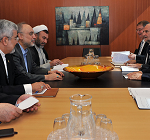This is turning into a roller-coaster year for those who pray that the Western fear of Iran’s uranium enrichment programme will not result in conflict.
The year opened with Israeli leaders baying for Iranian blood, Western politicians portraying Iran as a threat to their security, and Iran warning that an attack on its nuclear plants would close the Straits of Hormuz.
But at the 14 April talks in Istanbul, Iran, the US and the EU, with Russian and Chinese encouragement, agreed to negotiate to ensure that Iran meets its Nuclear Non-Proliferation Treaty (NPT) obligations on the one hand, and that Iran’s right to the peaceful use of nuclear energy is respected on the other. This process would be guided by “the principle of the step-by-step approach and reciprocity”.
These words sparked hope that at last the West was ready to acknowledge Iran’s right to enrich uranium provided all nuclear material in Iran’s possession remains in peaceful use. It looked as though the West intended to negotiate constructively, giving in order to take, and without expecting to have things all its own way.
But when the parties next met in Baghdad on 23-24 May, the outlook quickly darkened. The West requested that Iran cease all enrichment operations at its Fordow facility and export the enriched (20%) uranium produced there since 2010 – not unreasonable, since Iran has signalled that it is open to a deal where Fordow is concerned. But then the West offered in return none of the sanctions relief for which Iran has been angling. Instead it offered nuclear technology cooperation, spare parts for Iranian aircraft, and to refrain from bringing in further UN sanctions – a senseless offer since Iran knows that Russia is opposed to adding to the existing battery of UN sanctions, and a tactless one.
Commenting on the West’s offer, a former Iranian ambassador, now resident in the West, characterised it as peanuts in exchange for diamonds. He was exaggerating for effect, obviously, but his reaction highlights two things. Iran regards its small stock of 20% enriched uranium as one of the strongest cards in its hand (because the material could be enriched to weapons-grade within weeks). And Iran is negotiating not for baubles but to be rid of the sanctions that are hurting ordinary Iranians, and to regularise its position as an NPT party.
Of course in any negotiation it is common practice to open with a high bid. One cannot assume that the West’s negotiators expected Iran to welcome their offer or that they do not have a better offer in reserve for the next meeting, which is scheduled to take place in Moscow on 19 June. The EU could, for instance, undertake not to implement its ban on importing Iranian oil, which is due to come into effect on 1 July, and to continue insuring Iranian oil shipments. The US could promise to relax pressure on India, China, Japan and South Korea to cut back purchases of Iranian oil.
Yet unconfirmed reports from Washington hint that any optimism would be premature.
The Obama administration will have no room for manoeuvre on sanctions in an electoral year. The US, it appears, has been convinced by Israel that it must continue to insist on Iran suspending indefinitely all production of enriched uranium, even low (3.5%) enriched uranium at the Natanz plant.
American and European governments seem confident that oil and financial sanctions will induce Iran to settle on Western terms within the coming year.
The West has reverted to engagement not to arrive at a negotiated settlement of the nuclear dispute by applying the principle of reciprocity, but to keep Israel in its kennel and anaesthetise the oil markets in the run-up to the US Presidential election.
On the other hand, it is not hard to see that the West will have to offer something of value in Moscow to keep Iran engaged. In the absence of an adequate offer, Iran, unmoved by the threat of further sanctions, will break off contact. Then fears of conflict will push up the price of oil again as US election-day approaches.
Iran has been compliant with its NPT safeguards obligation since 2004. Americans and Israelis assess that Iran is not building nuclear weapons, nor does it possess them; nor are Iran’s leaders suicidal fanatics. Other NPT Non-Nuclear Weapon States that have conducted nuclear weapons research have been left in possession of enrichment plants. Many states, including Israel, have ignored UN Security Council resolutions.
So the moral and practical case for singling out Iran for special treatment grows weaker by the month.
Can India help the West to grasp this and to seize, not squander the opportunity created in Istanbul on 14 April? Maybe – or maybe not. Indian observers say that at this time the mediating privilege remains with Russia and China, while non-P5 countries like India are caught in the pincer of Israeli inflexibility. They add that this is reflected in the U.S. position and in Iranian fatalism that it is always a target for the West.
Ambassador Peter Jenkins is a former British diplomat who worked on the Iranian nuclear issue when ambassador to the International Atomic Energy Agency in Vienna (2001-06).
This article was exclusively written for Gateway House: Indian Council on Global Relations. You can read more exclusive content here.
For interview requests with the author, or for permission to republish, please contact outreach@gatewayhouse.in.
© Copyright 2012 Gateway House: Indian Council on Global Relations. All rights reserved. Any unauthorized copying or reproduction is strictly prohibited.


